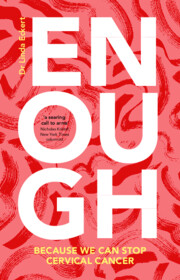Book contents
- Enough
- Reviews
- Enough
- Copyright page
- Dedication
- Contents
- Figures
- The Calling
- Part One A Preventable Cancer
- Part Two The Science behind Cervical Cancer
- Part Three The Prevention Problem
- 8 The Deadly Link between Inequality and Cervical Cancer
- 9 Losing the Life Lottery because of Where You Are Born
- 10 Sex, Lies, and Logistics: Obstacles to Vaccination beyond the Marketplace
- 11 Putting Out the Fires: Obstacles to Screening
- 12 “Dying Inside”: Obstacles to Treatment – and the Catastrophic Consequences
- 13 What Money Cannot Buy
- Part Four Getting to Enough
- Acknowledgments
- Reader Resources
- References
- Index
12 - “Dying Inside”: Obstacles to Treatment – and the Catastrophic Consequences
from Part Three - The Prevention Problem
Published online by Cambridge University Press: 11 January 2024
- Enough
- Reviews
- Enough
- Copyright page
- Dedication
- Contents
- Figures
- The Calling
- Part One A Preventable Cancer
- Part Two The Science behind Cervical Cancer
- Part Three The Prevention Problem
- 8 The Deadly Link between Inequality and Cervical Cancer
- 9 Losing the Life Lottery because of Where You Are Born
- 10 Sex, Lies, and Logistics: Obstacles to Vaccination beyond the Marketplace
- 11 Putting Out the Fires: Obstacles to Screening
- 12 “Dying Inside”: Obstacles to Treatment – and the Catastrophic Consequences
- 13 What Money Cannot Buy
- Part Four Getting to Enough
- Acknowledgments
- Reader Resources
- References
- Index
Summary
It can be painful to witness the toll of cervical cancer on women offered next-to-no treatment options. Persons with cervixes who acquire the disease in places like Africa or Southeast Asia often experience a brutal life trajectory. In the absence of highly trained professionals, sophisticated medical facilities, and expensive surgical or radiation equipment, most cervical cancer patients in lower-income countries are sent home to die. These deaths can be protracted and lonely, with little access to palliative care. What’s more, the stigma of the disease – associated with “dirty” female reproductive organs and the smell of advanced cancer – can lead to social banishment in a sufferer’s final days. In higher-income countries, greater availability of treatment is still no guarantee of equity. Low-income patients in the United States are often cut off from insurance once cancer goes into remission, excluding them from critical follow-up. Pockets of inequity, the rural–urban divide, and inconsistent access to care mean women from affluent countries die inexcusably from a preventable cancer. The inhumane circumstances cervical cancer sufferers face worldwide remind us of this mission’s urgency.
Keywords
- Type
- Chapter
- Information
- EnoughBecause We Can Stop Cervical Cancer, pp. 176 - 198Publisher: Cambridge University PressPrint publication year: 2024

